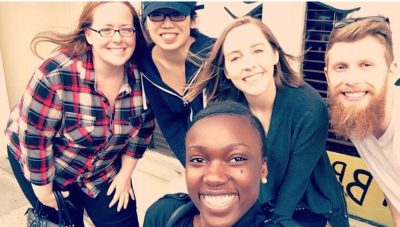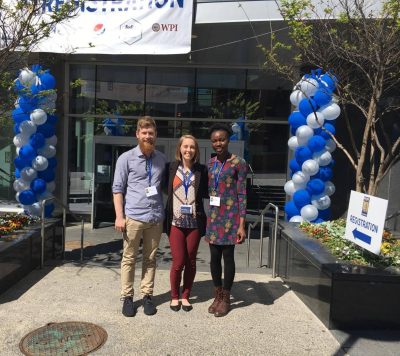
Back, from left to right: Anne Wilson, Crystal Wong, Vicky Madge, Travis Swan. Front: Nana Frimpong.
By Bianca Chan, TLS Staff Writer
Five Carleton students were among a group of undergraduates who took to the stage in Memphis earlier this year to prove that it is not only graduate students who are conducting influential research.
Nina Frimpong, Vicky Madge, Travis Swan, Anne Wilson and Crystal Wong represented Carleton at the 31st annual National Conference on Undergraduate Research (NCUR) – the largest showcase in the U.S. for undergraduate research across all fields of study.
Though they all come from diverse research backgrounds, the five Carleton students say they took away similar experiences that have helped affirm career paths and encouraged growth and discovery in new fields of study.
Thanks to the iCUREUS research internship provided by the Discovery Centre, these young researchers and future ones like them will have the opportunity to present their research and underscore how influential undergraduate research can be.
Madge, a biomedical engineering researcher, says that it’s rare for undergraduate students to enter graduate studies with conference presentation experience. The skills she has developed both at NCUR and through undergraduate research will benefit her graduate studies greatly, she adds.
“I think I have improved my skills of reaching out to audiences of different academic backgrounds,” she says. “Coming from a biomedical engineering background, it is easy to get lost in the jargon. I learned how to deliver my research in such a way that it speaks to a larger audience.”
Wong agrees. She researched negotiating a Canada-China Free Trade Agreement and says that the research experience helped develop her analytical and communication skills, especially her ability to interact with professors and approach primary sources.
In many cases, the experiences gained and skills honed through participating in NCUR 2017 has spurred an interest – and a confidence – in career and graduate pursuits, something these students say is one of the most valuable takeaways from this experience.
“Nanotechnology was a novel area of research to me and I was open to learning new things and growing to become specialized in that field,” says Frimpong, who studied under chemistry professor Maria DeRosa. She says that presenting at NCUR made her realize the importance communication and collaboration have in the research community.
“I learned that to be successful in research, you had to be open to collaboration since one area of research cannot solve a problem but many areas come into play to produce a final solution,” she says.
“This experience enabled me to better understand published works relevant to the project which informed future works, helped me to learn how to balance working with and without supervision, communicate better as a scientist and jumpstart my career as a researcher,” she adds.
For Wilson, the practical skills she gained through NCUR 2017 bolstered her education in ways that are not easily achieved in a classroom setting.
“The hands-on experience provides a level of insight into how research methods work in practical ways that you don’t necessarily understand from reading about it in a textbook,” she says. “There’s a lot of time, energy, skill and expertise needed to successfully carry out research projects and participating in that process is very educational.”
Wilson adds that it’s not just the specific techniques used in the lab that will help her going forward, but also more general academic and organizational skills that are changing how she approaches her work, both inside and outside of an academic setting.
Research is often considered to be an activity for graduate students. Only recently has its value in undergraduate education been recognized. And now, because of students like Frimpong, Madge, Swan, Wilson and Wong, it’s proving to be a high-impact practice for all levels.
